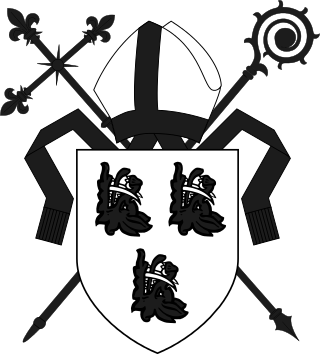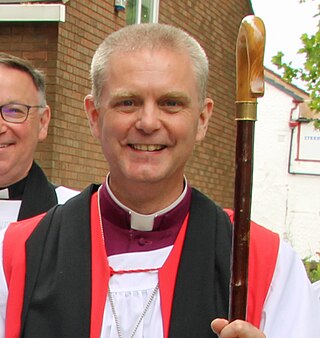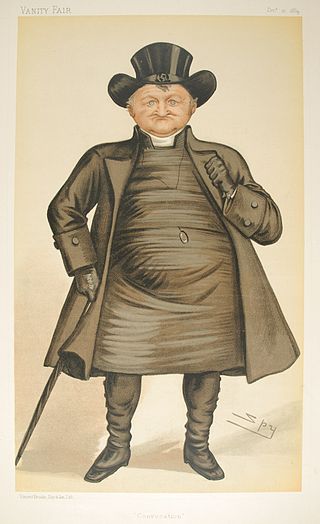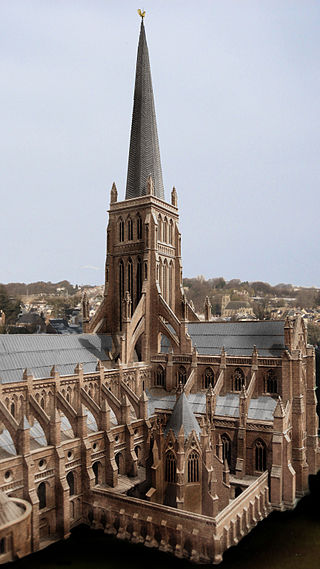Related Research Articles

Richard Neile was an English churchman, bishop successively of six English dioceses, more than any other man, including the Archdiocese of York from 1631 until his death.

Roger Northburgh was a cleric, administrator and politician who was Bishop of Coventry and Lichfield from 1321 until his death. His was a stormy career as he was inevitably involved in many of the conflicts of his time: military, dynastic and ecclesiastical.
The Dean of the Chapel Royal, in any kingdom, can be the title of an official charged with oversight of that kingdom's chapel royal, the ecclesiastical establishment which is part of the royal household and ministers to it.
The Royal Almonry is a small office within the Royal Households of the United Kingdom, headed by the Lord High Almoner, an office dating from 1103. The almoner is responsible for distributing alms to the poor.
Richard Montagu was an English cleric and prelate.
The Bishop of Lichfield is the ordinary of the Church of England Diocese of Lichfield in the Province of Canterbury. The diocese covers 4,516 km2 of the counties of Powys, Staffordshire, Shropshire, Warwickshire and West Midlands. The bishop's seat is located in the Cathedral Church of the Blessed Virgin Mary and Saint Chad in the city of Lichfield. The Bishop's residence is the Bishop's House, Lichfield, in the cathedral close. In the past, the title has had various forms. The current bishop is Michael Ipgrave, following the confirmation of his election on 10 June 2016.

The Diocese of Chester is a Church of England diocese in the Province of York covering the pre-1974 county of Cheshire and therefore including the Wirral and parts of Stockport, Trafford and Tameside.

Lawrence Booth served as bishop of Durham and lord chancellor of England, before being appointed archbishop of York.

John Overall (1559–1619) was the 38th bishop of the see of Norwich from 1618 until his death one year later. He had previously served as Bishop of Coventry and Lichfield, as Dean of St Paul's Cathedral from 1601, as Master of Catharine Hall from 1598, and as Regius Professor of Divinity at Cambridge University from 1596. He also served on the Court of High Commission and as a Translator of the King James Version of the Bible.
Robert Wilmer Woods,, known as Robin Woods, was an English Anglican bishop. He was the Bishop of Worcester from 1971 to 1982. He previously served as Archdeacon of Sheffield from 1958 to 1962, and as Dean of Windsor from 1962 to 1970.

George Day was the Bishop of Chichester.

Henry Dudley Ryder was a prominent English evangelical Anglican bishop in the early years of the nineteenth century, most notably as Bishop of Lichfield. He was the first evangelical to be raised to the Anglican episcopate.
Henry Bernard Hodgson was an Anglican bishop in the first half of the 20th century.
Robert de Stretton was Bishop of Coventry and Lichfield following the death of Roger Northburgh in 1358. A client of Edward, the Black Prince, he became a "notorious figure" because it was alleged that he was illiterate, although this is now largely discounted as unlikely, as he was a relatively efficient administrator.
Peter Vannes was an Italian Catholic churchman who became a royal official in England, and Dean of Salisbury.

The Bishop of Chester is the Ordinary of the Church of England Diocese of Chester in the Province of York.

Edward Bickersteth was an Anglican priest in the 19th century.

The Dean and Chapter of St Paul's Cathedral was the titular corporate body of St Paul's Cathedral in London up to the end of the twentieth century. It consisted of the dean and the canons, priests attached to the cathedral who were known as "prebendaries" because of the source of their income. The Dean and Chapter was made up of a large number of priests who would meet "in chapter", but such meetings were infrequent and the actual governance was done by the Administrative Chapter headed by the dean, made up of several senior "residentiary canons", who were also known as the "Dean and Canons of St Paul’s" or simply "The Chapter".
William Fleshmonger(? -1541/42), the son of a Winchester College tenant, was born in Hambledon, Hampshire. He was a Doctor of Canon Law and Dean of Chichester during the turmoil of the English Reformation.
Paul Richard Thomas SSC is a British Anglican bishop who has served as Bishop of Oswestry, a suffragan bishop in the Diocese of Lichfield and the provincial episcopal visitor for the western half of the Province of Canterbury since February 2023. From 2011, he was vicar of St James's Church, Paddington.
References
- ↑ "Sampson, Richard (SM506R)". A Cambridge Alumni Database. University of Cambridge.
![]() This article incorporates text from a publication now in the public domain : Herbermann, Charles, ed. (1913). "Richard Sampson". Catholic Encyclopedia . New York: Robert Appleton Company.
This article incorporates text from a publication now in the public domain : Herbermann, Charles, ed. (1913). "Richard Sampson". Catholic Encyclopedia . New York: Robert Appleton Company.
